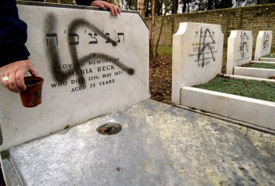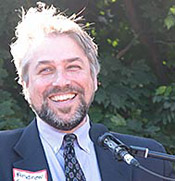Economic scapegoating, rise of the radical right are contributing to burgeoning rates of violence

A U.S. State Department report on religious freedom released in early May found what it called a “continued global increase in anti-Semitism,” as evidenced by these and other incidents. In addition, a study published by Tel Aviv University’s Kantor Center for the Study of Contemporary European Jewry says anti-Semitic activity in 2012 increased by 30 percent over the previous year.
Rutgers Today reached out to Andrew Getraer, executive director of Rutgers Hillel, for some insights into why violence against Jews and Jewish institution is on the rise in Europe, South America and the Middle East, among other regions.
Getraer, who was born in Geneva, has been at Hillel since 2001. He is a graduate of Dartmouth College and the University of Edinburgh.
Rutgers Today: Historically, a spike in anti-Semitic attitudes has accompanied severe economic conditions, as struggling people seek to identify a scapegoat for their ills. Are we seeing these conditions in play now?
Andrew Getraer: Economic scapegoating is certainly an element of it. We see this in Greece, one of the countries most economically devastated since the global economic crash of 2008. There, the openly fascist, anti-Semitic Golden Dawn Party has become a major political force. But we have also seen virulent and sometimes violent anti-Semitism in nations not undergoing that level of economic disaster, such as Norway, Sweden and Venezuela.
Rutgers Today: The report out of Tel Aviv University points to the burgeoning of the radical right in many European countries – particularly Greece, Hungary and Ukraine, where parties spouting anti-Semitic rhetoric are on the rise. What is fueling this phenomenon, and how likely is it to spread throughout the continent and beyond?

Rutgers Today: Is there is difference in the nature and the manifestation of anti-Semitism in Middle Eastern countries and in the rest of the world?
Andrew Getraer: It is tempting to think so, but I believe it is all one and the same. Much of the anti-Semitism one sees throughout the Middle East appears to be directed at Israel; however the language, stereotypes and images are adapted almost directly from traditional Nazi and Christian anti-Semitism. The label is sometimes changed from “Jews” to “Zionists” (often they don’t even bother) but the images and stereotypes are identical. This is particularly odd, because stereotypes of hook-nosed Jews, blood libels, etc, were unknown in the Middle East historically. They are European imports, which have become embedded in the Middle East and are now being exported back to the rest of the world.
Rutgers Today: The recent reports listed 273 attacks against Jews in 2012, some of them students and teenagers. Additionally, more than 100 synagogues were vandalized or attacked, as well as 59 community structures such as schools. Should American Jews be concerned that it could happen here?
Andrew Getraer: As the Sept. 11, 2001 attacks, the Fort Hood shooting, the Boston Marathon bombing and dozens of other attacks in our country have shown, we are neither immune to nor protected from the violent hatreds that are growing around the world. In fact, it has been happening here. Witness the synagogue bombings in northern New Jersey last year. There have been violent attacks against Jewish community centers, schools and charitable facilities in every region of the country. We don’t have armed guards in front of every synagogue in America – which is standard in nearly every other country in the world -- but these attacks have become a regular concern of Jewish communal life. Publically available FBI data on bias crime shows that anti-Jewish violence in American is by far the largest form of religious or ethnically based bias crime, representing a shocking 62 percent of all hate crimes motivated by religious bias in 2011, the last year for which the report is complete. This has been fairly consistent for over a decade. In fact, for most of this century the number has been closer to 67 percent.
Rutgers Today: U.S. Secretary of State John Kerry recently named Jewish communal leader Ira Forman as his envoy to combat anti-Semitism. The envoy presses governments to address issues of anti-Semitism within their borders. What advice would you give Forman as he takes over his new duties?
Andrew Getrae: I would advise Special Envoy Forman to be bold, fearless and focused. Never hesitate to call out governments and nations that promote hatred and prejudice; do not waver in the face of political pressures; and do not allow false humanitarians to hijack and subvert your mission as they have done with United Nations Human Rights Council and similar bodies. We know all too well that anti-Semites mean what they say, and that the consequences of ignoring anti-Semitism are extremely grave.
Media Contact: Fredda Sacharow
732-932-7084 Ext. 610
E-mail: fsacharo@rci.rutgers.edu